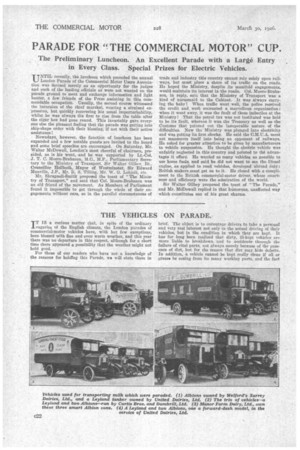PARADE FOR `THE COMMERCIAL MOTOR" CUP.
Page 20

If you've noticed an error in this article please click here to report it so we can fix it.
The Preliminary Luncheon. An Excellent Parade with a Large Entry in Every Class. Special Prizes for Electric Vehicles.
UNTIL recently, the luncheon which preceded the annual London Parade of the Commercial Motor Users Association was devised merely as an opportunity for the judges and such of the leading officials as were not wanted on the parade ground to meet and exchange information and light banter, a few friends of the Press assisting in this commendable occupation. Usually, the second course witnessed the incursion of the chief marshal, wearing a strained expression, but quickly recovering his usual imperturbability, whilst he was always the first to rise from the table after the cigar box had gone round. This invariably gave everyone else the pleasant feeling that the parade was getting into ship-shape order with their blessing, if not with their active assistance!
Nowadays, however, the function of luncheon has been expanded and a few notable guests are invited to the board !Ind some brief speeches are encouraged. On Saturday, Mr. 'Walter McDowell, London's most cheerful of chairmen, presided, as is his wont, and he was supported by Lt.-Cal. J. T. C. Moore-Brabazon, M.O., M.P.. Parliamentary Secretary to the Ministry of Transport, Sir Walter Gilbev. Bt.. Councillor Heilbuth, Mayor of Westminster, Sir Edward Manville, J.P., Mr. It. S. Tilling, Mr. W. G. Lobjoit, etc.
Mr. Shrapnell-Smith proposed the toast of "The Ministry of Transport," and said that Col. Moore-Brabazon was an old friend of the movement. As Members of Parliament found it impossible to get through the whole of their engagements without cars, so in the parallel circumstances of
trade and industry this country cannot rely solely upon railways, but must place a share of its traffic on the roads. He hoped the Ministry, despite its manifold engagements, would maintain its interest in the roads. Col, Moore-Brabason, in reply, saki that the Ministry of Transport was a kind of nursemaid to the Cabinet. It was always carrying the baby ! When traffic went well, the police received the credit and were accounted a marvellous organization: when it went awry, it was the fault of those imbeciles at the Ministry! That the petrol tax was not instituted was held to be its fault, whereas it was the Treasury as well as the Customs that pointed out the insuperable nature of the difficulties. Now the Ministry was plunged into electricity and was getting its first shocks. He said the C.M.U.A. must not manoeuvre itself into being an opponent of railways. He asked for greater attention to be given by manufacturers to vehicle suspension. He thought the electric vehicle was unfairly neglected in this country and pointed to theadvantages it offers. He wanted as many vehicles as possible to use home fuels, and said he did not want to see the Diesel engine, as applied to road vehicles, developed abroad only: British makers must get on to it. He closed with a compliment to the British commercial-motor driver, whose smartness and efficiency were the admiration of the world.
Sir Walter Gilbey proposed the toast of "The Parade," and Mr. McDowell replied in that humorous, unaffected way which constitutes one of his great charms.


































